What Is PTSD (Post Traumatic Stress Disorder) – An Introduction
Principal Category: Recovery Psychology
Authors:
• National Center for PTSD
• Tim McGuinness, Ph.D. – Anthropologist, Scientist, Director of the Society of Citizens Against Relationship Scams Inc.
Posttraumatic stress disorder (PTSD) is a mental health problem. PTSD can only develop after you go through or see a life-threatening event. It’s normal to have stress reactions to these types of events, and most people start to feel better after a few weeks. If symptoms last longer than a month and are causing problems in your life, it could be PTSD. Learn about PTSD symptoms and treatments to help you recover.

PTSD & Psychological Trauma in Scam Victims and Its Lingering Effects
By: Dr. Tim McGuinness
Victims of scams often endure significant psychological trauma and PTSD that persists long after the scam has ended.
The immediate aftermath of discovering they’ve been deceived is typically characterized by intense feelings of shame, guilt, and embarrassment. Many victims blame themselves for falling prey to the scam, believing they should have recognized the signs of manipulation. This self-blame can lead to severe emotional distress and can cause multiple symptoms, such as cognitive dissonance and other disorders including anxiety, depression, and a diminished sense of self-worth.
The realization that someone they trusted was manipulating them for financial gain often results in a profound sense of betrayal, further compounding their emotional pain.
The psychological trauma experienced by scam victims can also have long-term effects on their mental and physical health.
It can impact social relationships, and somatic (bodily) physical health, affecting numerous organs, and can lead to autoimmune diseases.
Trust issues are common, as victims become wary of forming new relationships or relying on others. This mistrust can extend to family and friends, making it difficult for victims to seek support and leading to social isolation. The fear of being deceived again can create a persistent state of hypervigilance, where victims are constantly on guard, anticipating potential threats. This ongoing stress can impact their overall well-being, affecting their ability to function in daily life and maintain healthy relationships.
Moreover, the financial loss resulting from the scam can exacerbate the psychological impact, leading to practical consequences such as debt, loss of savings, and diminished financial security. These financial difficulties can perpetuate a cycle of stress and anxiety, making recovery even more challenging. The trauma of being scammed can also affect victims’ willingness to engage in financial activities, such as investing or making online transactions, due to fear of being exploited again. To support scam victims in their recovery, it is crucial to provide them with emotional support, counseling, and practical assistance, helping them rebuild their confidence and regain control over their lives.
Somatic and Physical Effects of Psychological Trauma in Scam Victims
Psychological trauma from scams can manifest in a variety of somatic or physical symptoms, reflecting the profound connection between the mind and body.
Victims often experience chronic stress, which triggers the body’s fight-or-flight response. This prolonged state of heightened arousal can lead to persistent physical symptoms such as headaches, muscle tension, and gastrointestinal issues like irritable bowel syndrome. Sleep disturbances are also common, with victims suffering from insomnia or nightmares related to their traumatic experiences. The constant stress and anxiety can weaken the immune system, making individuals more susceptible to illnesses and infections.
Moreover, the emotional burden of psychological trauma can contribute to more severe health conditions over time. Victims may develop cardiovascular problems, such as high blood pressure and increased risk of heart disease, due to the ongoing stress. There can also be changes in appetite, leading to weight loss or gain, and associated issues like malnutrition or obesity. Additionally, the physical symptoms can exacerbate the psychological distress, creating a vicious cycle where the body’s response to stress amplifies the victim’s anxiety and depression. Addressing these somatic symptoms is crucial in the holistic treatment of trauma, often requiring a combination of medical intervention, therapy, and stress-reducing practices such as mindfulness, exercise, and relaxation techniques to help victims recover both mentally and physically.
PTSD – Post Traumatic Stress Disorder Basics
By: U.S. National Center for PTSD
It’s normal to have upsetting memories, feel on edge, or have trouble sleeping after a traumatic event (also called “trauma”). At first, it may be hard to do daily activities you are used to doing. Going to work or school, even spending time with people you care about, can feel difficult right after a traumatic event. But most people start to feel better after a few weeks. For some people, PTSD symptoms may start later, or they may come and go over time.
If it’s been longer than a month and thoughts and feelings from the trauma are upsetting you or causing problems in your life, you may have PTSD.
Who Develops PTSD?
Anyone can develop PTSD at any age. Some factors can increase the chance that someone will have PTSD, many of which are not under that person’s control. For example, having a very intense or long-lasting traumatic event or getting injured during the event can make it more likely that a person will develop PTSD. PTSD is also more common after certain types of trauma, like combat and sexual assault.
Personal factors—like previous traumatic exposure, age and gender—can affect whether a person will develop PTSD. What happens after the traumatic event is also important. Stress can make PTSD more likely, while social support can make it less likely.
What Are the Symptoms of PTSD?
PTSD symptoms usually start soon after the traumatic event, but they may not appear until months or years later. They also may come and go over many years. If the symptoms last longer than 4 weeks, cause you great distress, or interfere with your work or home life, you might have PTSD.
There are 4 types of PTSD symptoms. To be diagnosed with PTSD, you need to have each type. That said, everyone experiences symptoms in their own way.
- Reliving the event (also called re-experiencing symptoms). Memories of the traumatic event can come back at any time. They can feel very real and scary. For example:
- You may have nightmares.
- You may feel like you are going through the event again. This is called a flashback.
- You may see, hear or smell something that causes you to relive the event. This is called a trauma reminder, cue or trigger. News reports, seeing an accident, or hearing fireworks are examples of trauma reminders.
- Avoiding things that remind you of the event. You may try to avoid situations or people remind you of the trauma event. You may even avoid talking or thinking about the event. For example:
- You may avoid crowds because they feel dangerous.
- You may avoid driving if you were in a car accident or if your military convoy was bombed.
- If you were in an earthquake, you may avoid watching movies about earthquakes.
- You may keep very busy or avoid getting help so you don’t have to think or talk about the event.
- Having more negative thoughts and feelings than before the event. The way you think about yourself and others may become more negative because of the trauma. For example:
- You may feel numb—unable to have positive or loving feelings toward other people—and lose interest in things you used to enjoy.
- You may forget about parts of the traumatic event or not be able to talk about them.
- You may think the world is completely dangerous, and no one can be trusted.
- You may feel guilt or shame about the event, wishing you had done more to keep it from happening.
- Feeling on edge or keyed up (also called hyperarousal). You may be jittery, or always alert and on the lookout for danger. You might suddenly become angry or irritable. For example:
- You may have a hard time sleeping.
- You may find it hard to concentrate.
- You may be startled by a loud noise or surprise.
- You might act in unhealthy ways, like smoking, abusing drugs or alcohol, or driving aggressively.
What Are the Symptoms of PTSD in Children?
Children may have symptoms like those above or other symptoms. As children get older, their symptoms are more like those of adults. Here are some examples of PTSD symptoms in children and teens:
- Children under 6 may get upset if their parents are not close by, have trouble sleeping, or act out the trauma in their play.
- Children ages 7 to 11 may also act out the trauma through play, drawings or stories. Some have nightmares or become more irritable or aggressive. They may also want to avoid school or have trouble with schoolwork or friends.
- Children ages 12 to 18 have symptoms more similar to adults: depression, anxiety, withdrawal, or reckless behavior like substance abuse or running away.
Read more about PTSD in Children and Teens.
Do People With PTSD Get Better?
After a traumatic event, it’s normal to think, act, and feel differently than usual–but most people start to feel better after a few weeks. Talk to a doctor or mental health care provider (like a psychiatrist, psychologist, counselor or social worker) if your symptoms:
- Last longer than a month
- Are very upsetting
- Disrupt your daily life
“Getting better” means different things for different people. There are treatment options for PTSD. For many people, these treatments can get rid of symptoms altogether. Others find they have fewer symptoms or feel that their symptoms are less intense. Your symptoms don’t have to interfere with your everyday activities and relationships.
What Treatments Are Available?
Both trauma-focused psychotherapy (sometimes called counseling or talk therapy) and medication are proven to treat PTSD. Sometimes people combine psychotherapy and medication.
Trauma-focused psychotherapy
A few trauma-focused psychotherapies are the most highly recommended treatments for PTSD. “Trauma-focused” means that the therapy focuses on the memory of the traumatic event or its meaning. The 3 most effective types of trauma-focused psychotherapy are:
- Cognitive Processing Therapy (CPT) where you learn skills to understand how trauma changed your thoughts and feelings. Changing how you think about the trauma can change how you feel.
- Prolonged Exposure (PE) where you talk about your trauma repeatedly until memories are no longer upsetting. This will help you get more control over your thoughts and feelings about the trauma. You also go to places or do things that are safe, but that you have been staying away from because they remind you of the trauma.
- Eye Movement Desensitization and Reprocessing (EMDR), which involves focusing on sounds or hand movements while you talk about the trauma. This helps your brain work through the traumatic memories.
Learn more about these and other Talk Therapies for PTSD.
Medications for PTSD
Certain medications can be effective for treating PTSD symptoms. Some specific medications are used to treat PTSD symptoms. These include sertraline, paroxetine and venlafaxine. Learn more about Medications for PTSD.
What Constitutes PTSD
PTSD and DSM-5
In 2013, the American Psychiatric Association revised the PTSD diagnostic criteria in the 5th edition of its Diagnostic and Statistical Manual of Mental Disorders (DSM-5; 1). PTSD was included in a new category in DSM-5, Trauma- and Stressor-Related Disorders. All conditions included in this classification require exposure to a traumatic or stressful event as a diagnostic criterion. DSM-5-TR was published in March 2022 to include scientific advances since the release of DSM-5. No changes were made to the PTSD diagnostic criteria for adults in this update (2).
For a review of the DSM-5 changes to the criteria for PTSD, including resources for DSM-5-TR updates, see the American Psychiatric Association website on educational resources for DSM-5 and DSM-5-TR.
DSM-5 Criteria for PTSD
Full copyrighted criteria are available from the American Psychiatric Association (2). All of the criteria are required for the diagnosis of PTSD. The following text summarizes the diagnostic criteria:
Criterion A (1 required): The person was exposed to: death, threatened death, actual or threatened serious injury, or actual or threatened sexual violence, in the following way(s):
- Direct exposure
- Witnessing the trauma
- Learning that the trauma happened to a close relative or close friend
- Indirect exposure to aversive details of the trauma, usually in the course of professional duties (e.g., first responders, medics)
Criterion B (1 required): The traumatic event is persistently re-experienced, in the following way(s):
- Unwanted upsetting memories
- Nightmares
- Flashbacks
- Emotional distress after exposure to traumatic reminders
- Physical reactivity after exposure to traumatic reminders
Criterion C (1 required): Avoidance of trauma-related stimuli after the trauma, in the following way(s):
- Trauma-related thoughts or feelings
- Trauma-related reminders
Criterion D (2 required): Negative thoughts or feelings that began or worsened after the trauma, in the following way(s):
- Inability to recall key features of the trauma
- Overly negative thoughts and assumptions about oneself or the world
- Exaggerated blame of self or others for causing the trauma
- Negative affect
- Decreased interest in activities
- Feeling isolated
- Difficulty experiencing positive affect
Criterion E (2 required): Trauma-related arousal and reactivity that began or worsened after the trauma, in the following way(s):
- Irritability or aggression
- Risky or destructive behavior
- Hypervigilance
- Heightened startle reaction
- Difficulty concentrating
- Difficulty sleeping
Criterion F (required): Symptoms last for more than 1 month.
Criterion G (required): Symptoms create distress or functional impairment (e.g., social, occupational).
Criterion H (required): Symptoms are not due to medication, substance use or other illness.
Two specifications:
- Dissociative Specification. In addition to meeting criteria for diagnosis, an individual experiences high levels of either of the following in reaction to trauma-related stimuli:
- Depersonalization. Experience of being an outside observer of or detached from oneself (e.g., feeling as if “this is not happening to me” or one were in a dream).
- Derealization. Experience of unreality, distance, or distortion (e.g., “things are not real”).
- Delayed Specification. Full diagnostic criteria are not met until at least 6 months after the trauma(s), although onset of symptoms may occur immediately.
Note: DSM-5 introduced a preschool subtype of PTSD for children ages six years and younger.
SCARS NOTE:
The above describes the basics of PTSD resulting from Psychological Trauma. This is not intended to be used to diagnose PSTD, just to provide an educational introduction. See a licensed mental healthcare provider to any questions regarding how PTSD might apply to yourself.
IMPORTANT NOTE: This article is intended to be an introductory overview of complex psychological, neurological, physiological, or other concepts, written primarily to help victims of crime understand the wide-ranging actual or potential effects of psychological trauma they may be experiencing. The goal is to provide clarity and validation for the confusing and often overwhelming symptoms that can follow a traumatic event. It is critical to understand that this content is for informational purposes only and does not constitute or is not a substitute for professional medical advice, diagnosis, or treatment. If you are experiencing distress or believe you are suffering from trauma or its effects, it is essential to consult with a qualified mental health professional for personalized care and support.

Welcome to the SCARS INSTITUTE Journal of Scam Psychology
A Journal of Applied Scam, Fraud, and Cybercrime Psychology – and Allied Sciences
A dedicated site for psychology, victimology, criminology, applied sociology and anthropology, and allied sciences, published by the SCARS INSTITUTE™ – Society of Citizens Against Relationship Scams Inc.
TABLE OF CONTENTS
A Question of Trust
At the SCARS Institute, we invite you to do your own research on the topics we speak about and publish, Our team investigates the subject being discussed, especially when it comes to understanding the scam victims-survivors experience. You can do Google searches but in many cases, you will have to wade through scientific papers and studies. However, remember that biases and perspectives matter and influence the outcome. Regardless, we encourage you to explore these topics as thoroughly as you can for your own awareness.
Please Leave A Comment
Recent Comments
On Other Articles
[better_recent_comments number=”5″ format=”{avatar} on {post}: “{comment}” {date}” avatar_size=”20″]
A Note About Labeling!
We often use the term ‘scam victim’ in our articles, but this is a convenience to help those searching for information in search engines like Google. It is just a convenience and has no deeper meaning. If you have come through such an experience, YOU are a Survivor! It was not your fault. You are not alone! Axios!
Statement About Victim Blaming
Some of our articles discuss various aspects of victims. This is both about better understanding victims (the science of victimology) and their behaviors and psychology. This helps us to educate victims/survivors about why these crimes happened and to not blame themselves, better develop recovery programs, and to help victims avoid scams in the future. At times this may sound like blaming the victim, but it does not blame scam victims, we are simply explaining the hows and whys of the experience victims have.
These articles, about the Psychology of Scams or Victim Psychology – meaning that all humans have psychological or cognitive characteristics in common that can either be exploited or work against us – help us all to understand the unique challenges victims face before, during, and after scams, fraud, or cybercrimes. These sometimes talk about some of the vulnerabilities the scammers exploit. Victims rarely have control of them or are even aware of them, until something like a scam happens and then they can learn how their mind works and how to overcome these mechanisms.
Articles like these help victims and others understand these processes and how to help prevent them from being exploited again or to help them recover more easily by understanding their post-scam behaviors. Learn more about the Psychology of Scams at www.ScamPsychology.org
Psychology Disclaimer:
All articles about psychology, neurology, and the human brain on this website are for information & education only
The information provided in these articles is intended for educational and self-help purposes only and should not be construed as a substitute for professional therapy or counseling.
While any self-help techniques outlined herein may be beneficial for scam victims seeking to recover from their experience and move towards recovery, it is important to consult with a qualified mental health professional before initiating any course of action. Each individual’s experience and needs are unique, and what works for one person may not be suitable for another.
Additionally, any approach may not be appropriate for individuals with certain pre-existing mental health conditions or trauma histories. It is advisable to seek guidance from a licensed therapist or counselor who can provide personalized support, guidance, and treatment tailored to your specific needs.
If you are experiencing significant distress or emotional difficulties related to a scam or other traumatic event, please consult your doctor or mental health provider for appropriate care and support.
Also, please read our SCARS Institute Statement About Professional Care for Scam Victims – here
If you are in crisis, feeling desperate, or in despair please call 988 or your local crisis hotline.
SCARS Institute Resources:
- If you are a victim of scams go to www.ScamVictimsSupport.org for real knowledge and help
- Enroll in SCARS Scam Survivor’s School now at www.SCARSeducation.org
- To report criminals visit https://reporting.AgainstScams.org – we will NEVER give your data to money recovery companies like some do!
- Sign up for our free support & recovery help by https://support.AgainstScams.org
- Follow us and Find our podcasts, webinars, and helpful videos on YouTube: https://www.youtube.com/@RomancescamsNowcom
- SCARS Institute Songs for Victim-Survivors: https://www.youtube.com/playlist…
- See SCARS Institute Scam Victim Self-Help Books at https://shop.AgainstScams.org
- Learn about the Psychology of Scams at www.ScamPsychology.org
- Dig deeper into the reality of scams, fraud, and cybercrime at www.ScamsNOW.com and www.RomanceScamsNOW.com
- Scam Survivor’s Stories: www.ScamSurvivorStories.org
- For Scam Victim Advocates visit www.ScamVictimsAdvocates.org
- See more scammer photos on www.ScammerPhotos.com


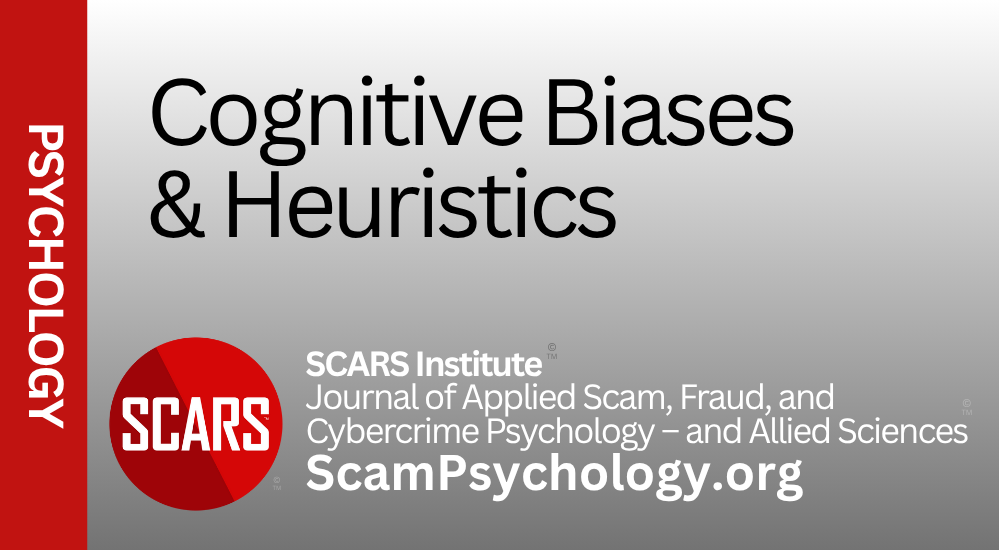
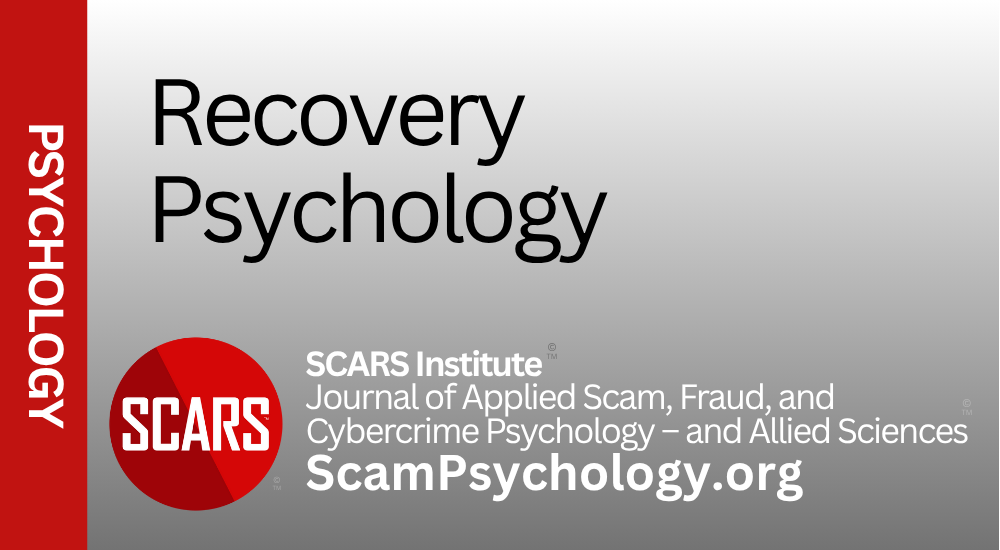
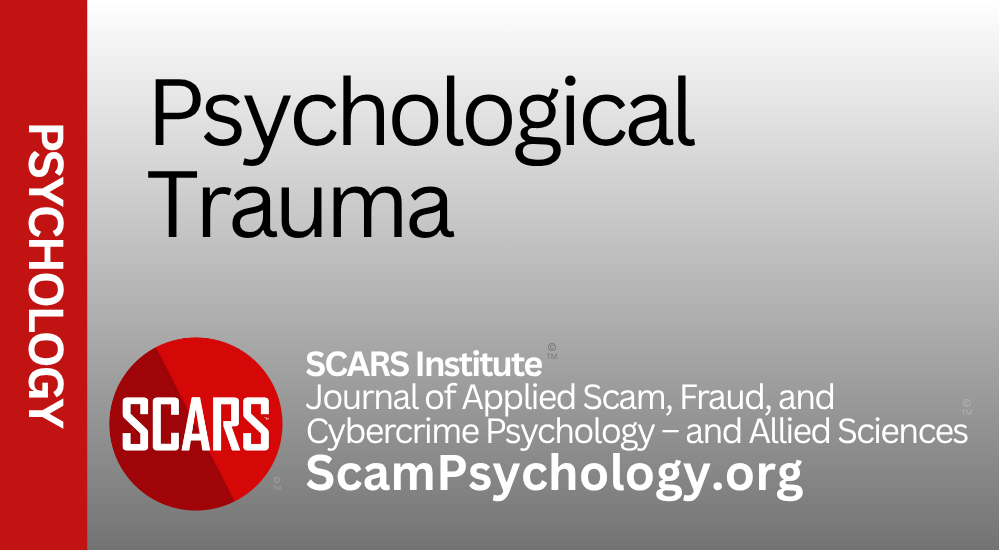
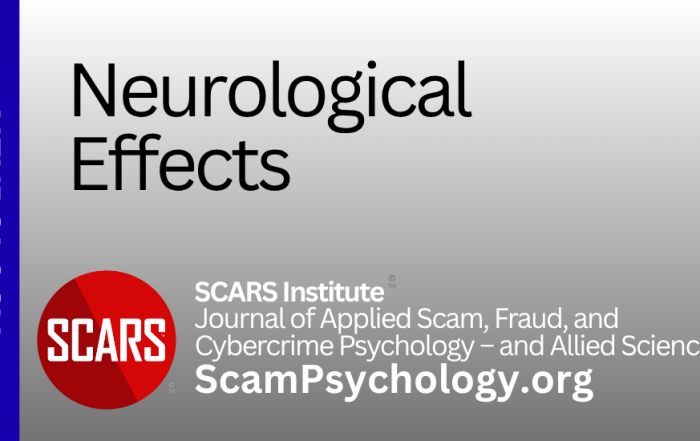

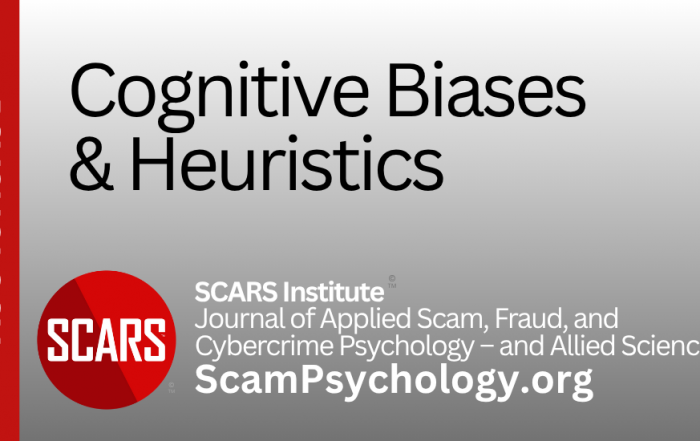
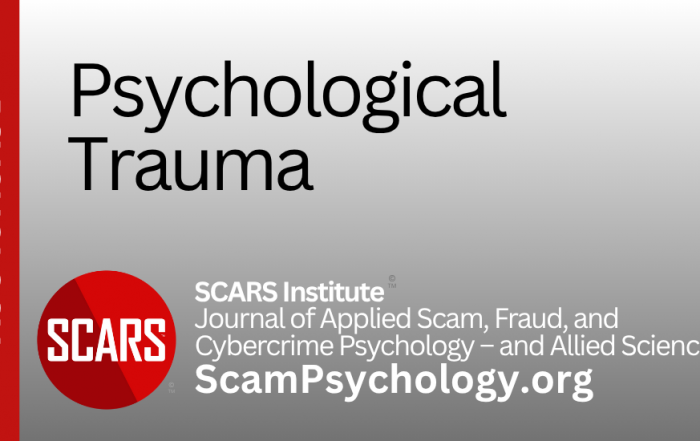
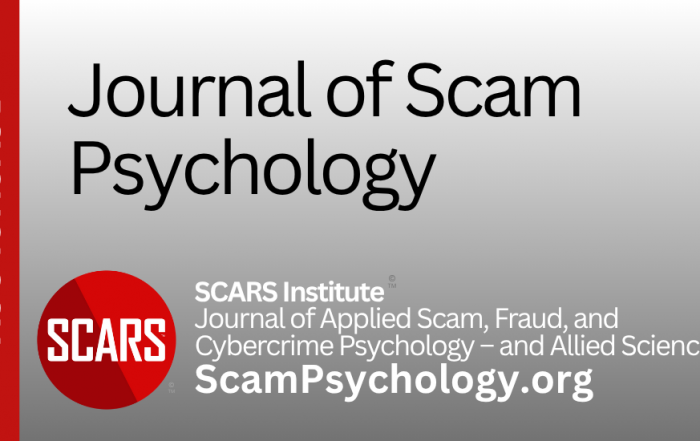
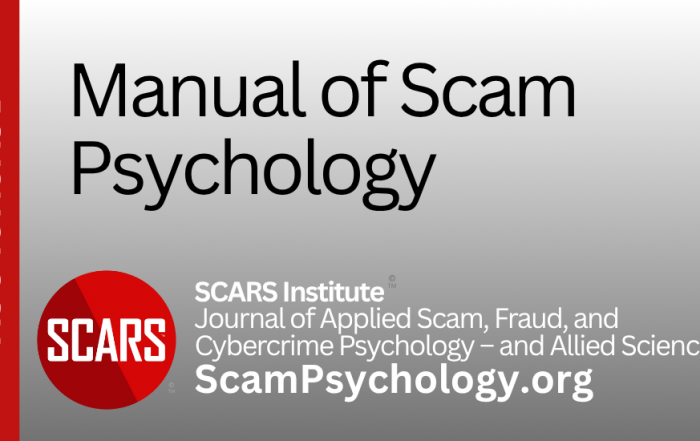

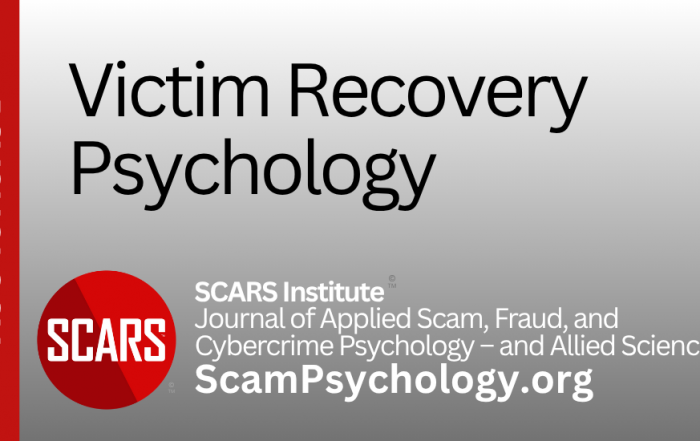
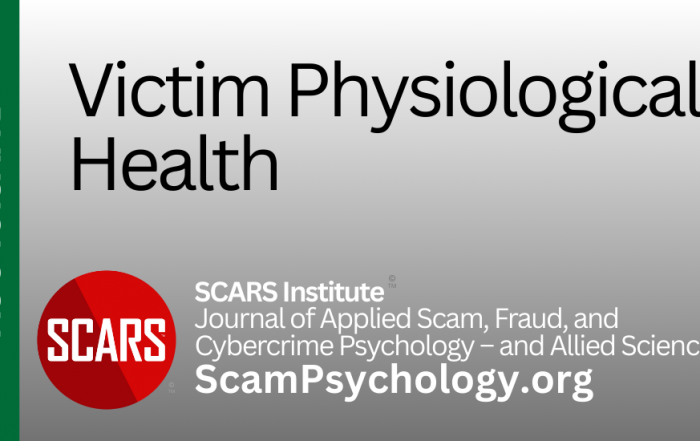

![niprc1.png1_-150×1501-11[1]](https://scampsychology.org/wp-content/uploads/2025/05/niprc1.png1_-150x1501-111.webp)
Um a artigo excelente para que as pessoas saibam estão a passar por um momento de “stress” pós-traumático, e que o devem tratar com a maior brevidade, no sentido de evitar sequelas somáticas
Sometimes I feel more PTSD symptoms reading SCARS articles. Although I know it’s important to understand the scam experience, the articles do trigger uncomfortable memories.
I understand this is not to be used as a diagnostic tool, however, I see many of the symptoms of PTSD in the here and now in my current life. It’s been nearly 30 years since my diagnosis and I had intense therapy for it as I lived many years of abuse with my former husband.
This article was insightful. Thank you for providing it.
Knowing the criterion of PTSD is appreciated, especially since it can manifest in the future. Having an idea what to look for is very insightful.
Thank you.
These articles are very triggering for me at this time. I will have to come back to them later if it is fine with you.
Yes, for some survivors, deeper psychological learning, while important and even essential, can be postponed until you are less overwhelmed.